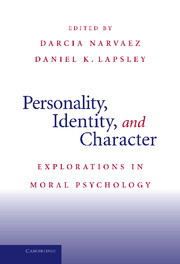Book contents
- Frontmatter
- Contents
- Contributors
- Introduction
- 1 The Moral Personality
- 2 The Moral Functioning of the Person as a Whole: On Moral Psychology and Personality Science
- 3 Moral Science? Still Metaphysical After All These Years
- 4 Cultural Pluralism and Moral Identity
- 5 Neuroscience and Morality: Moral Judgments, Sentiments, and Values
- 6 Triune Ethics Theory and Moral Personality
- 7 Early Foundations: Conscience and the Development of Moral Character
- 8 The Development of the Moral Personality
- 9 Urban Neighborhoods as Contexts for Moral Identity Development
- 10 Moral Personality Exemplified
- 11 Greatest of the Virtues? Gratitude and the Grateful Personality
- 12 The Elusive Altruist: The Psychological Study of the Altruistic Personality
- 13 Growing Toward Care: A Narrative Approach to Prosocial Moral Identity and Generativity of Personality in Emerging Adulthood
- 14 Moral Identity, Integrity, and Personal Responsibility
- 15 The Dynamic Moral Self: A Social Psychological Perspective
- 16 The Double-Edged Sword of a Moral State of Mind
- 17 Moral Identity in Business Situations: A Social-Cognitive Framework for Understanding Moral Functioning
- 18 The Moral Functioning of Mature Adults and the Possibility of Fair Moral Reasoning
- 19 Moral Personality: Themes, Questions, Futures
- Author Index
- Subject Index
15 - The Dynamic Moral Self: A Social Psychological Perspective
Published online by Cambridge University Press: 05 June 2012
- Frontmatter
- Contents
- Contributors
- Introduction
- 1 The Moral Personality
- 2 The Moral Functioning of the Person as a Whole: On Moral Psychology and Personality Science
- 3 Moral Science? Still Metaphysical After All These Years
- 4 Cultural Pluralism and Moral Identity
- 5 Neuroscience and Morality: Moral Judgments, Sentiments, and Values
- 6 Triune Ethics Theory and Moral Personality
- 7 Early Foundations: Conscience and the Development of Moral Character
- 8 The Development of the Moral Personality
- 9 Urban Neighborhoods as Contexts for Moral Identity Development
- 10 Moral Personality Exemplified
- 11 Greatest of the Virtues? Gratitude and the Grateful Personality
- 12 The Elusive Altruist: The Psychological Study of the Altruistic Personality
- 13 Growing Toward Care: A Narrative Approach to Prosocial Moral Identity and Generativity of Personality in Emerging Adulthood
- 14 Moral Identity, Integrity, and Personal Responsibility
- 15 The Dynamic Moral Self: A Social Psychological Perspective
- 16 The Double-Edged Sword of a Moral State of Mind
- 17 Moral Identity in Business Situations: A Social-Cognitive Framework for Understanding Moral Functioning
- 18 The Moral Functioning of Mature Adults and the Possibility of Fair Moral Reasoning
- 19 Moral Personality: Themes, Questions, Futures
- Author Index
- Subject Index
Summary
When psychologists explore the role of the self in moral motivation and behavior, they typically take a personological approach. Some seek to describe a general personality structure shared by widely recognized moral exemplars, whereas others examine individual differences in the centrality of mortality to one's personal goals. A social-psychological approach to the moral self complements these personological perspectives by taking into account the situational malleability of moral self-regard, or one's self-perceived moral standing at any given moment. Recent research reviewed in this chapter demonstrates the value added by this perspective: First, when people are made secure about their morality, they sometimes act less morally (moral credentials); second, moral exemplars are disliked rather than admired when their behavior is seen as an indictment of people's own choices (moral resentment); and third, people sometimes boost their moral self-regard to compensate for failures in other domains (moral compensation). These phenomena underscore the importance of understanding moral self-regard as just one aspect of a highly dynamic self-concept.
THE SELF IN MORAL PSYCHOLOGY
For decades, moral psychology mostly left the self out of its analyses. It focused instead on moral reasoning and on the cognitive underpinnings of decisions about right and wrong (Kohlberg, 1969). The neglect of the self and emphasis on the mechanics of moral reasoning was a reaction against the perceived murkiness of psychodynamic theories influential at the time, and the dearth of empirical support for concepts such as “superego strength” to explain moral learning (see Kohlberg, 1963).
- Type
- Chapter
- Information
- Personality, Identity, and CharacterExplorations in Moral Psychology, pp. 341 - 354Publisher: Cambridge University PressPrint publication year: 2009
- 115
- Cited by



